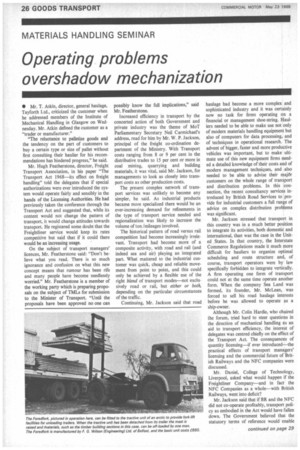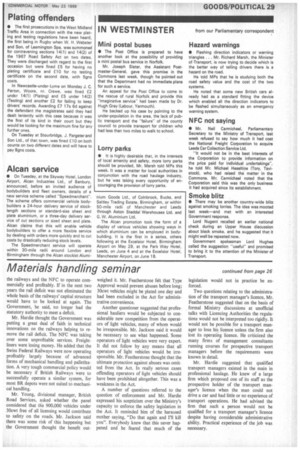Operating problems overshadow mechanization
Page 28

Page 31

If you've noticed an error in this article please click here to report it so we can fix it.
• Mr. T. Atkin, director, general haulage, Tayforth Ltd., criticized the customer when he addressed members of the Institute of Mechanical Handling in Glasgow on Wednesday. Mr. Atkin defined the customer as a "trader or manufacturer."
"The reluctance to palletize goods and the tendency on the part of customers to buy a certain type or size of pallet without first consulting their haulier for his recommendations has hindered progress," he said.
Mr. Hugh Featherstone, director, Freight Transport Association, in his paper "The Transport Act 1968—its effect on freight handling" told the delegates that if special authorizations were ever introduced the system would operate fairly and sensibly in the hands of the Licensing Authorities. He had previously taken the conference through the Transport Act and suggested that, while its content would not change the pattern of transport, it would change attitudes towards transport. He registered some doubt that the Freightliner service would keep its rates competitive but said that if it could there would be an increasing usage.
On the subject of transport managers' licences, Mr. Featherstone said: "Don't believe what you read. There is so much ignorance and confusion on what this new concept means that rumour has been rife and many people have become needlessly worried." Mr. Featherstone is a member of the working party which is preparing proposals on the subject of TMLs for submission to the Minister of Transport. "Until the proposals have been approved no one can possibly know the full implications," said Mr. Featherstone.
Increased efficiency in transport by the concerted action of both Government and private industry was the theme of MoT Parliamentary Secretary Neil Carmichael's address, read for him by Mr. W. P. Jackson, principal of the freight co-ordination department of the Ministry. With Transport costs ranging from 8 or 9 per cent in the distributive trades to 15 per cent or more in coal mining, quarrying and building materials, it was vital, said Mr. Jackson, for managements to look as closely into transport costs as other production costs.
The present complex network of transport services was unlikely to become any simpler, he said. As industrial products became more specialized there would be an ever-increasing demand for refinements in the type of transport service needed and regionalization was likely to increase the volume of ton /mileages involved.
The historical pattern of road versus rail competition had become increasingly irrelevant. Transport had become more of a composite activity, with road and rail (and indeed sea and air) playing an integrated part. What mattered to the industrial customer was quick, cheap and reliable movement from point to point, and this could only be achieved by a flexible use of the right blend of transport modes—not exclusively road or rail, but either or both, depending on the particular circumstances of the traffic.
Continuing, Mr. Jackson said that road haulage had become a more complex and sophisticated industry and it was certainly now no task for firms operating on a financial or management shoe-string. Hauliers needed to be able to make use not only of modern materials handling equipment but also of computers for data processing, and of techniques in operational research. The advent of bigger, faster and more productive vehicles was important, but to make ultimate use of this new equipment firms needed a detailed knowledge of their costs and of modern management techniques, and also needed to be able to advise their majdr customers on the whole range of transport and distribution problems. In this connection, the recent consultancy services introduced by British Road Services to provide for industrial customers a full range of advice on complex distribution problems was significant.
Mr. Jackson stressed that transport in this country was in a much better position to integrate its activities, both domestic and international, than was the case in the United . States. In that country, the Interstate Commerce Regulations made it much more difficult for hauliers to organize optimal scheduling and route structure and, of course, transport operators were by law specifically forbidden to integrate vertically. A firm operating one form of transport could not at the same time operate another form. When the company Sea Land was formed, its founder, Mr. McLean, was forced to sell his road haulage interests before he was allowed to operate as a ship-owner.
Although Mr. Colin Hardie, who chaired the forum, tried hard to steer questions in the direction of mechanical handling as an aid to transport efficiency, the interest of delegates was centred chiefly on the effect of the Transport Act. The consequences of quantity licensing—if ever introduced—the practical effects of transport managers' licensing and the commercial future of British Railways and the NFC companies were discussed.
Mr. Daniel, College of Technology, Liverpool, asked what would happen if the Freightliner Company—and in fact the NFC Companies as a whole—with British Railways, went into deficit?
Mr. Jackson said that if BR and the NFC did not co-operate profitably, transport policy as embodied in the Act would have fallen down. The Government believed that the statutory terms of reference would enable
the railways and the NFC to operate commercially and profitably. If in the next two years the rail deficit was not eliminated the whole basis of the railways' capital structure would have to be looked at again. The Government, he said, no longer had the statutory authority to meet a deficit.
Mr. Hardie thought the Government was putting a great deal of faith in technical innovations on the railways helping to remove the rail deficit. The NFC was taking over some unprofitable services. Freightliners were losing money. He added that the Swiss Federal Railways were now operating profitably largely because of advanced forms of mechanical handling and palletization. A very tough commercial policy would be necessary if British Railways were to successfully operate a similar system, for most BR depots were not suited to mechanical handling.
Mr. Young, divisional manager, British Road Services, asked whether the panel considered that the 900.000 vehicles under 30cwt free of all licensing would contribute to safety on the roads. Mr. Jackson said there was some risk of this happening but the Government thought the benefit out weighed it. Mr. Featherstone felt that Type Approval would prevent abuses before long; 30ewt vehicles might be plated one day and had been excluded in the Act for administrative convenience.
Another questioner suggested that professional hauliers would be subjected to considerable new competition from the operators of light vehicles, many of whom would be irresponsible. Mr. Jackson said it would be necessary to see what happened. Some operators of light vehicles were very expert. It did not follow by any means that all operators of light vehicles would be irresponsible. Mr. Featherstone thought that the ultimate protection against abuses was omitted from the Act. In really serious cases offending operators of light vehicles should have been prohibited altogether. This was a weakness in the Act.
A number of questions referred to the question of enforcement and Mr. Hardie expressed his scepticism over the Ministry's capacity to enforce the safety legislation in the Act. It reminded him of the harassed mother saying, "Do that again and I'll kill you". Everybody knew that this never happened and he feared that much of the legislation would not in practice be enforced.
Two questions relating to the administration of the transport manager's licence, Mr. Featherstone suggested that on the basis of formal Ministry discussions at unofficial talks with Licencine Authorities the regulations would not be interpreted too rigidly. It would not be possible for a transport manager to lose his licence unless the firm also lost its operating licence. He criticized the many firms of management consultants running courses for prospective transport managers before the requirements were known in detail.
Mr. Hardie suggested that qualified transport managers existed in the main in professional haulage. He knew of a large firm which proposed one of its staff as the prospective holder of the transport manager's licence when the man could not drive a car and had little or no experience of transport operations. He had advised the firm that such a person would not be qualified for a transport manager's licence despite having considerable administrative ability. Practical experience of the job was necessary.
































































































































